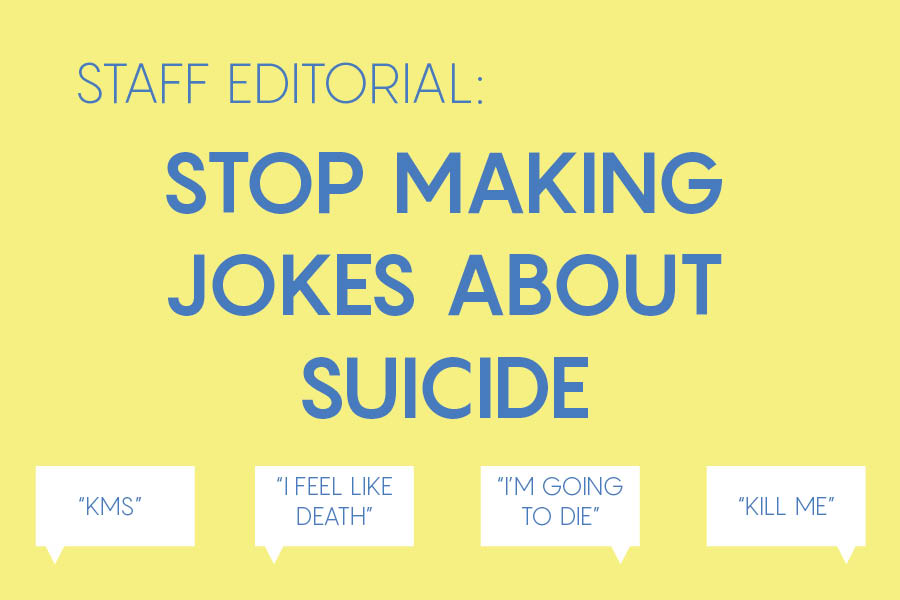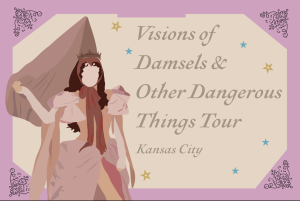Staff editorial: Stop joking about suicide
In the midst of students using fatalistic humor, or jokes about death, the JagWire staff urges them to reconsider and stop
October 2, 2017
Many students casually talk about wanting to die, whether it be on social media or in real life. When people say things like “kms” (meaning “kill myself”) they generally try to be ironic and self-deprecating because they want to convey the message that they are embarrassed, stressed or annoyed. What students fail to realize, though, is how their words have an impact outside of those viewing their “relatable” post.
You’ve heard it a million times before: beware of the words that come out of your mouth because you can’t take them back. Words like “I want to die,” and “kill me” apply only to the speaker, so it hypothetically shouldn’t be such a big deal to the audience. But we need to consider that we have helped create a culture in which mental health is trivialized because we joke about it so much. This is highlighted by the fact that 85 percent of students surveyed by the JagWire reported having heard a joke about suicide or having made it themselves, but only sixteen percent have said they have considered suicide.
Making a finsta post that tacks “kms” on at the end may bring you immediate gratification, but venting on social media is like consuming empty calories – it may feel good in the moment, but it’s ultimately unhealthy.
Language has a huge impact on culture. By normalizing these jokes called “fatalistic humor,” we create a society in which having negative mental health is a regular state of being This type of language minimizes how significant mental disorders actually are. We can’t discern those who genuinely need help from those just following the trend. The lines become blurred, and the humor escalates as more and more people begin to join in.
Some of us make these jokes to cope with tough situations. We understand that. But changing your mindset to move in a positive direction can help you maintain a healthier mindset and overall sense of being. Journaling, talking with a friend or adult, or receiving professional care are all healthier avenues to vent than making jokes about being killed or wanting to die. If you find yourself in a place of struggle, find an adult you trust to talk to, such as school social worker Debbie Gudenkauf in the lower B-hall. Receiving help is ultimately better to moving forward and growing in a positive direction than continuing to joke in circles about dying.
Finding healthier ways to cope can be difficult, but doing so is rewarding. High school is a vulnerable time for many teenagers. Seeking out help and finding good outlets is so important to dealing with struggle. But just changing your language can enable you to better help yourself and those around you, and that positivity is worth sharing.
Because we lack many developmental experiences, most of us lack healthy ways to cope with situations thrown at us as we grow. However, joking about suicide isn’t always the best way to cope with struggle. Laughter can increase your wellbeing. Joking about a desire to die will not. In the end, positive thinking and thoughts will be a lot more beneficial to you and society.









Sophie • Dec 26, 2017 at 1:50 pm
The problem with this article is that it’s confusing romanticizing with normalizing. Romanticizing is implying that mental health is not a big deal, or even that it’s somewhat good. Normalizing is implying that it’s okay to have mental health issues, and there’s nothing wrong with you. Mental health has been taboo for centuries, and its left its mark by making people with depression feel like they’re going crazy or they’re weird or wrong in some way. Fatalistic humor doesn’t promote the idea that being depressed is a part of life or anything like that, it promotes that many other people have mental health issues and you’re not weird or crazy. How is that not better? We have a casual way of talking about mental health now, and fifty years ago, when fatalistic humor was not popularized, there were many people who just didn’t talk about it, fearing what people would think, or just went ahead and killed themselves. Humor is a perfectly fine coping mechanism. Don’t try to take it away, because there are many people who really benefit from it.
Karen Booth • Oct 3, 2017 at 1:14 pm
I am an old lady (76). When I was 15 and 16 I was suicidal. The person who saved me, I believe, was my history teacher who listened whenever I needed to talk. I have lived a wonderful full life with great kids and super grandkids. None of them would have existed if not for that teacher. To know that if you can just make it through one hour or one day the road gets smoother with experience and maturity.
This was a wonderful piece of journalism.